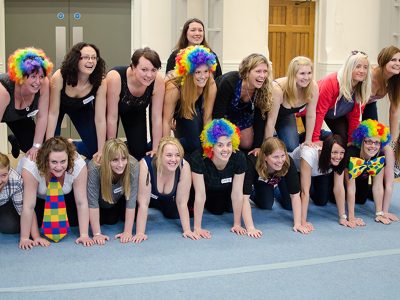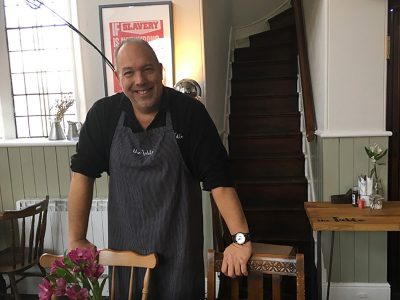WYNFORD KNOWS BEST
Peer-based recovery and why it works
“There is a lot of compelling evidence which suggests the failure with treatment in this country lies in that it is an acute model dealing with a chronic, long-term condition and unless you provide ongoing support and aftercare, it’s not going to work.”
Factors in recovery
“Recognising your need for help is fundamental. Then there’s suffering – one of the greatest creative forces in nature. Hope comes next – others have recovered and it is attractive, achievable and there for everyone who really wants it. Families also play a big part in recovery.”
The Living Room’s Reaching Out workshop, led by Carol Hardy, investigates addiction and equips inexperienced members of the community to help those in their congregations, families and communities who suffer with addiction. The first in the series of workshops will take place on 8 December at Argoed Baptist Chapel near Blackwood. For more information, call 029 2030 2100.
It’s a gloomy Thursday outside The Living Room, Cardiff. A pamphlet on the coffee-table illustrates the details of their Reaching Out workshop, due to run this December. It trains people to become recovery coaches for addicts – a role Wynford Ellis Owen, the head of The Living Room, has played for years now.
When the 67 year old walks into the room, you know exactly why he’s had such a high success rate with it. It’s because of his ability to inundate a room with warmth. Perhaps you can attribute his charisma to his time as an actor, but the warmth – it’s the sort that only comes from having walked through the fire.

“Nobody plays God here – and people respond to that,” says Wynford of his successful peer-based recovery centre, The Living Room
Wynford was born a minister’s son in Denbighshire. As a child, he constantly whistled – something he believes you can’t do unless you’re truly happy. But after years of being cast as a curate to his father and feeling pressured by the expectations of others, little Wynford stopped whistling.
At 11, he found solace in his mother’s barbiturates. From then on, he scavenged for the next fix, befriending senior citizens to swipe tranquilisers, sleeping pills – anything that would alleviate his burden.
“For much of my early life, my parents, the education system, society imposed their values on me and it led to a spiritual bankruptcy. I didn’t know who I was,” he admits. At 18, Wynford found alcohol and spent many more years stumbling punch-drunk through the dimly-lit underpasses of his psyche.
“There was a voice in my head, screaming ‘Everything is over, everything is going to be alright’”
The denouement
So how did he emerge from the darkness? It happened in 1992, while he was working in television. “I’d run away to the only producer who would still give me work,” he says. “I was drunk when I arrived and he said to me, ‘When are you going to do something about your drinking?'” That was all it took. Owen drove down to the only treatment centre in Wales, stopping at every off-license on the way. His moment of clarity came outside one, bottle of beast in hand, bleeding and drunk. “I saw myself as I was and it brought me to my knees. There was a voice in my head, screaming ‘Everything is over, everything is going to be alright’. That voice is still in my head now and the more I listen to it, the better life becomes,” he says.
It’s hard to attribute the horrors of addiction to the man in this moment; someone whose virtues and victories far outshine this inherent vice. Today, the former dramatist is a proud husband, father and grandfather, recipient of last year’s Citizen’s Voice Award and the chief executive of the Welsh Council on Alcohol and Other Drugs.
He’s also penned three books. But he speaks most prolifically of his lovechild The Living Room. The free peer-based recovery centre opened in 2011 despite much opposition and has helped hundreds of addicts since.
Love is all you need
Owen sees his transition from entertainment to service as integral to his own recovery; he needed to become a giver rather than a taker. What’s the secret to its success? ”Many people believe they have to be good to be loved, but you don’t at The Living Room – you are loved here unconditionally,” he says.
It might be hard to relate to the junkie in the street, but according to Owen, addiction stems from the overarching desire to be loved – something we all crave alike – and receiving it is the cornerstone of recovery.
His journey is the stuff superhero stories are made of: of a man overcoming his suffering to alleviate the suffering of others. So what has he learned from the human experience after 67 long years? “That I am loved,” he asserts unwaveringly.
Watch Owen talk about the idea and philosophy behind The Living Room:
WYNFORD KNOWS BEST
Peer-based recovery and why it works
“There is a lot of compelling evidence which suggests the failure with treatment in this country lies in that it is an acute model dealing with a chronic, long-term condition and unless you provide ongoing support and aftercare, it’s not going to work.”
Factors in recovery
“Recognising your need for help is fundamental. Then there’s suffering – one of the greatest creative forces in nature. Hope comes next – others have recovered and it is attractive, achievable and there for everyone who really wants it. Families also play a big part in recovery.”
The Living Room’s Reaching Out workshop, led by Carol Hardy, investigates addiction and equips inexperienced members of the community to help those in their congregations, families and communities who suffer with addiction. The first in the series of workshops will take place on 8 December at Argoed Baptist Chapel near Blackwood. For more information, call 029 2030 2100.






